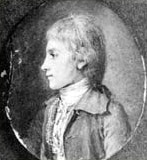 |
Unless you vacation in the West Indies, you’ve probably never heard of Nevis. Located a couple of hundred miles south and east of Puerto Rico, Nevis is a 36-square-mile chunk of rock dominated by the 3,200-foot natural lookout of Nevis Peak. If you visit the official website for Nevis, it won’t take you long to figure out that tourism is what drives the economy. Like many islands in the Caribbean, Nevis is blessed with spectacular views, a tropical climate, and gobs of blue-as-azure ocean.
But in the 18th century, tourism didn’t drive any economy, including Nevis. And while it’s a relative unknown to us today, back then this small island was well-known, and part of a European rivalry, which saw countries vying for a growing, and very lucrative, sugar trade. Fortunes could be made very quickly under the right circumstances, and those circumstances usually included lots of slaves to work the plantations. In addition, the British sent shiploads of criminals and other riffraff to Nevis, hoping to clean up the streets of London. Ron Chernow described it as “a tropical hellhole of dissipated whites and fractious slaves, all framed by a backdrop of luxuriant natural beauty.”
It was into this environment that Alexander Hamilton made his entrance on January 11, 1755…or maybe it was 1757. For a long time, 1757 was the recognized year. And while modern scholarship still hasn’t fully decided which year it was, close examination of the facts gives an edge to the earlier date.
But there is no doubt that Hamilton was an illegitimate child. In today’s culture, children born out of wedlock make up a significant percentage of all babies born. In 1755, that was not the case, and it raised eyebrows, even in a place of such moral laxity (dare I say debauchery?) as Nevis.
Rachel Faucette, Hamilton’s mother, was married off as a teen by her mother to Johann Michael Lavien, a man approaching 30 who, despite his flashy dress and aristrocratic pretense, tended to make terrible financial divisions and bumbled from one misfortune to another. The marriage was a nightmare. Rachel had no love for her husband, who eventually accused her of adultery (which may have been true) and threw her into prison, thinking some time behind bars would bring her around.
To the contrary, Rachel Faucette Lavien found her will strengthened and, upon her release, she simply left her husband (and a young son) on St. Croix and fled (with her mother) to St. Kitts, right next door to Nevis. And at some point, she met James Hamilton. He had come to the West Indies (like so many others) to seek a quick fortune in the world of sugar. But he was late to the game and lacked business sense (much like Lavien), so he ended up doing menial work attempting to make ends meet.
And from this relationship came two sons, James, Jr. and Alexander. And while their parents may have gotten married, the Church certainly did not recognize it. She had not officially divorced her first husband, which meant her “second” marriage was considered null and void. Her two children were, by extension, illegitimate.
And that stigma would follow Hamilton all his life, despite his tremendous accomplishments. Whether in the West Indies or in New York, family heritage and bloodlines meant a great deal in the 18th century. We’ve spent a lot of time discussing many of the facets of this complex man, and it’s safe to say that, throughout the fabric of his persona, the backdrop of his birth and those first 16 or 17 years spent in Nevis were deeply etched into it.
But rather than being overcome by his roots, Alexander Hamilton rose above stigma and hardship. He studied hard, had a head for business, and impressed those around him, to the point that the leaders on Nevis took up a collection and sent young Hamilton to America, where his talents and intelligence could be developed. Hamilton became a student, a graduate, an aide-de-camp to General Washington, a powerful lawyer, an awesome orator, a catalyst for a new Constitution when it was needed, and its most ardent defender when it was done. He was our first Treasury Secretary and, as we have learned on these pages, his influence is still with us, more than 200 years after his untimely death.
As Chernow writes, “Today, we are indisputably the heirs to Hamilton’s America, and to repudiate his legacy is, in many ways, to repudiate our modern world.”
Happy Birthday, Alexander Hamilton!!